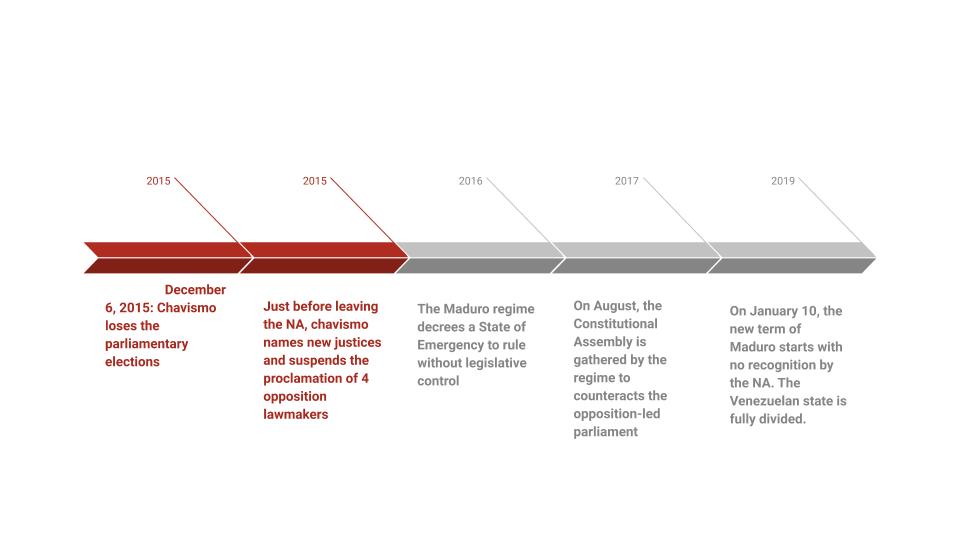The Supreme Tribunal Gives Maduro What Venezuelans Took from Him: An Obedient Parliament
With a combination of exceptional powers, harassment, jail, and exile, the Maduro government became a dictatorship by ignoring all its obligations to submit the Executive to the control of a Legislative controlled by the opposition since 2015. The Supreme Tribunal has been the main tool to void the legitimate National Assembly of people and functions.


CAR200. CARACAS (VENEZUELA), 05/01/2016.- Diputados de la coalición opositora Mesa de Unidad Democrática (MUD) posan para una foto dentro de las instalaciones de la Asamblea Nacional de Venezuela hoy, martes 5 de enero de 2016, en Caracas (Venezuela), después de la ceremonia de instalación de la nueva Asamblea con los diputados elegidos en las elecciones parlamentarias del pasado 6 de diciembre, donde la oposición es mayoría por primera vez en 17 años. EFE/Miguel Gutiérrez
Photo: iVenezuela Travel retrieved
Watching today’s events at the Venezuelan National Assembly, it’s easy to see how this really began on December 6th, 2015, the day of Venezuela’s last competitive elections.
Despite technical issues concerning the design of electoral circuits, the pressure exercised by regime henchmen in voting stations and the illegal extension of voting table schedules, citizen turnout gave the opposition a majority in the National Assembly, a triumph that chavismo could never get even after modifying the Framework Law on Electoral Processes in 2009, to impose a majority representation system.
However, chavismo has never allowed the National Assembly to exercise any control over the Executive Branch (or any of its other faculties), ever.
During 2019, Maduro’s regime has applied two strategies to boycott the sessions. First, like today, they’ve prevented lawmakers from accessing the Federal Legislative Palace, because state security forces had allegedly been alerted about explosives in the building.
This excuse was also used in January 5th, although both times the (chavista) National Constituent Assembly was allowed to hold session afterwards (they share the same building).
At the time of writing, 34 lawmakers, including PSUV dissidents, are facing some sort of judicial process against them.
However, the main strategy is to deny the National Assembly the quorum it needs to work: to do that, chavismo must vacate 29 seats. Right now, 17 seats are in jeopardy because the lawmakers that should occupy them, both principal lawmakers and their replacements, are in prison (like Juan Requesens and Edgar Zambrano), detained (like Gilber Caro), exiled (like Julio Borges and Gaby Arellano), under diplomatic protection (like Freddy Guevara and Américo De Grazia) or in hiding, after being stripped off their parliamentary immunity (like Juan Andrés Mejías and Luis Florido). At the time of writing, 34 lawmakers, including PSUV dissidents, are facing some sort of judicial process against them.
When this piece was being edited to be published, the TSJ accused deputies Carlos Paparoni, Miguel Pizarro, Franco Casella and Winston Flores of crimes like treason, conspiracy, rebellion, and usurping functions. The highest court in the land advised the ANC to strip them off their parliamentary immunity, as they’ve done to the others.
This judiciary sabotage isn’t new: on December 23rd, 2015, the National Assembly still chaired by Diosdado Cabello illegally repacked the Supreme Tribunal of Justice (TSJ) with 33 new justices. Seven days later, on December 30th, 2015, the TSJ suspended the proclamation of four Amazonas lawmakers representing the native communities of the Amazonas-Apure circuit, due to alleged electoral fraud denounced by PSUV.
It’s been 1,231 days since that complaint was filed, and there’s been no trial to determine its outcome.
 A timeline of the judiciary sabotage against the AN. The TSJ has issued 97 rulings to dissolve the National Assembly.
A timeline of the judiciary sabotage against the AN. The TSJ has issued 97 rulings to dissolve the National Assembly.
Based on that unresolved suspension, the TSJ declared the National Assembly in contempt when they decided to swear three of these lawmakers into office; this was also the chavista excuse to justify the installation of a National Constituent Assembly. Since then, the TSJ has issued 97 rulings to dissolve the National Assembly, which NGO Acceso a la Justicia sees as “the veiled abolishment of democracy,” because “the AN was kidnapped by the government through the justice system, which includes not only the Judiciary, but also the Prosecutor’s Office, the police, the prison system and the Ombudsman’s Office.”
Since then, the TSJ has issued 97 rulings to dissolve the National Assembly.
Endless State of Emergency
The assault against the National Assembly and opposition lawmakers is complemented by the State of Emergency declared by Maduro, on January 14th, 2016, to regulate food production and distribution, and also to freely use the national budget as well as non-budgetary resources.
That decree was valid until March 11th, 2016, but it’s been extended several times since, which means Maduro’s had special powers for the past three years. The last extension of the State of Emergency approved by the TSJ will coincide with the time the National Constituent Assembly should present a new Constitution. In theory, the text was discussed for the last two years, and a referendum could be held to approve it amidst a State of Exception, with Maduro occupying Miraflores Palace, with a severely affected parliamentary quorum, without any changes to the Electoral Branch and amidst a rampant complex humanitarian emergency.
Today’s events have been happening for years, and you can trace it back to that time when El Comandante named, by the power of his will alone, a new Metropolitan mayor over the vote of the people.
This is democracy in chavismo: tons of elections that only count when the reds win.
Caracas Chronicles is 100% reader-supported.
We’ve been able to hang on for 22 years in one of the craziest media landscapes in the world. We’ve seen different media outlets in Venezuela (and abroad) closing shop, something we’re looking to avoid at all costs. Your collaboration goes a long way in helping us weather the storm.
Donate




